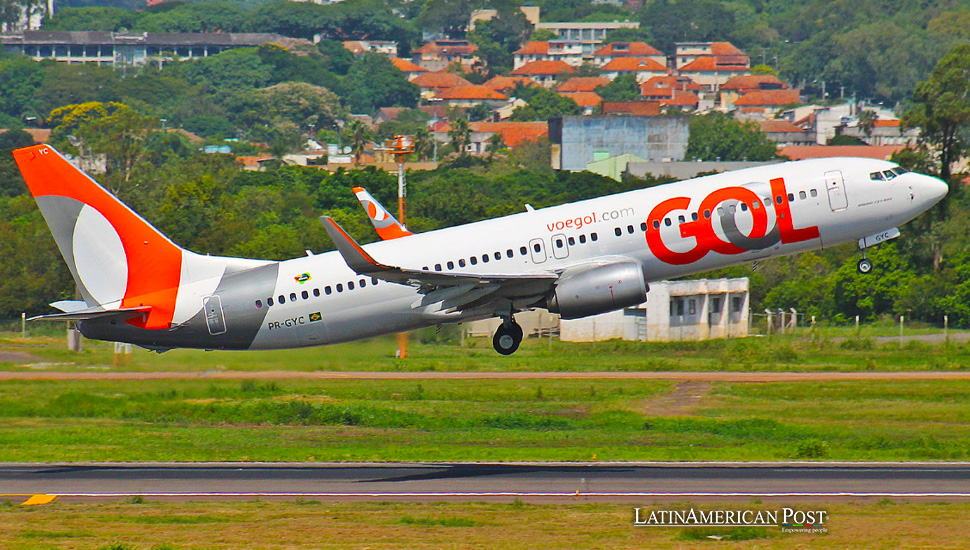Brazil’s Gol Airline Files for Chapter 11 Amid Financial Strain

Brazilian airline Gol announced its filing for Chapter 11 bankruptcy protection in the U.S., backed by a $950 million commitment from its parent company Abra Group, as it joins other Latin American airlines in navigating post-pandemic financial challenges.
Gol Airlines’ Strategic Move Amid Financial Struggles
Brazil’s Gol airline, a significant player in the country’s aviation industry, has made a decisive move amidst financial difficulties by filing for Chapter 11 bankruptcy protection in the United States. This step announced on Thursday, is bolstered by a substantial $950 million financial commitment from its holding company, Abra Group, which also controls the Colombian carrier Avianca. Although Gol and Avianca operate independently, this move aligns Gol with other Latin American airlines seeking bankruptcy protection after the pandemic, including its sister company Avianca, Mexico’s Aeromexico, and Chile-based LATAM Airlines.
The decision to file for bankruptcy protection follows recent media speculation about Gol’s financial strategy, even as the company reportedly pursued a “consensual” restructuring in discussions with its creditors. Gol’s approach aims to restructure its finances and fortify its business operations for long-term sustainability while maintaining normal operational activities.
Operational Challenges and Financial Struggles
Despite reporting operating solid figures and experiencing healthy demand for air travel in Brazil, Gol has been grappling with financial challenges. Analysts and rating agencies point out that while the airline’s operational performance is robust, it has been under pressure due to high leasing and interest expenses. These financial burdens have significantly impacted Gol’s cash flow and adversely affected its debt profile, necessitating a strategic reevaluation of its economic structure.
Compounding its financial struggles, Gol has also faced operational challenges, including capacity issues stemming from delayed aircraft deliveries from Boeing. This delay has hindered Gol’s growth ambitions, as the airline’s chief executive expressed. Additionally, maintenance pressures due to engine supply issues have further complicated the airline’s operational capacity.
Balancing Act for Future Viability
Gol’s prominence in Brazil’s aviation market is notable, with the airline holding a 33% market share last year, second only to LATAM Brasil. This market share is measured by revenue passenger kilometers, a key metric in the aviation industry that assesses traffic. The filing for bankruptcy protection thus represents not just a financial maneuver for Gol but also a significant event in the broader context of Brazil’s aviation sector.
The move to file for Chapter 11 bankruptcy protection indicates a strategic pivot for Gol, reflecting a broader trend among airlines in Latin America and globally. The aviation industry has been one of the hardest-hit sectors during the COVID-19 pandemic, with travel restrictions and a significant downturn in passenger demand leading to substantial financial strain. In this context, bankruptcy protection emerges as a vital tool for airlines to reorganize their finances and renegotiate debts. It appears more important in the post-pandemic landscape.
The support from Abra Group is crucial in this process, providing Gol with the necessary financial backing to navigate the bankruptcy proceedings and restructure its operations effectively. This support underscores the aviation industry’s interconnected nature, where one carrier’s fortunes can significantly impact related entities.
Monitoring Progress in a Dynamic Landscape
Gol’s decision to file for Chapter 11 is a critical step in addressing its immediate financial challenges and setting the stage for future growth and stability. The airline’s focus on restructuring its finances while maintaining normal operations is a balancing act, aiming to reassure passengers and stakeholders of its ongoing viability as a carrier.
However, the path ahead for Gol is challenging. The success of the bankruptcy proceedings and the airline’s subsequent recovery will depend on various factors, including the global economic environment, the pace of recovery in the aviation sector, and the effectiveness of Gol’s restructuring plan. The airline will need to navigate these proceedings while also adapting to the rapidly changing landscape of the aviation industry, marked by shifting consumer preferences, technological advancements, and evolving regulatory frameworks.
Also read: General Motors Announces Major Investment in Brazil’s Automotive Sector
In conclusion, Gol’s filing for Chapter 11 bankruptcy protection is a significant development in the context of Latin America’s aviation industry and the global post-pandemic economic recovery. It reflects airlines’ ongoing challenges in adapting to the new normal and the importance of strategic financial restructuring in ensuring long-term viability. As Gol embarks on this journey, the aviation industry and financial markets will closely watch its progress and the implications for the broader sector.





